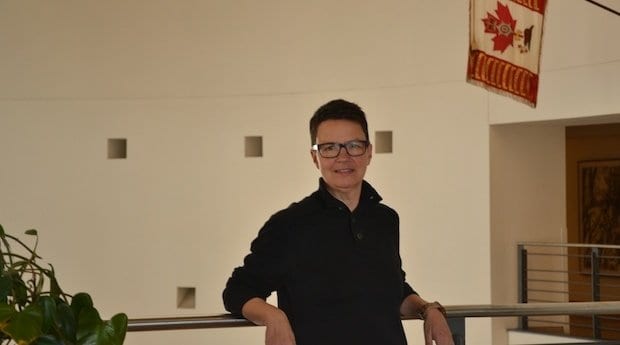For Catherine McKenney, walking into Ottawa City Hall is like coming home. As she strolls across the building’s brightly lit main foyer, she stops repeatedly to greet people. Many of them are former colleagues, and all of them have warm messages of congratulations for her.
McKenney caused a stir Oct 27 when she won a tight race for the councillor’s seat in Somerset ward, beating out 10 other hopefuls to fill the shoes of outgoing councillor Diane Holmes, who represented the downtown ward for close to 30 years. Not only is McKenney the first openly queer woman to be elected to council; she is also one of only four women out of 23 councillors.
“I’m honoured to be the first,” she says. “I am a bit surprised that it took this long, but that’s partly due to the fact that we don’t have very many women [in city politics], period.” During her campaign, McKenney spoke of the need for more strong, visible women in public positions, including an impassioned speech at the Dyke March in August. “I often lament that we don’t have enough strong women on city council, so I decided to do something about it,” she told the crowd to appreciative applause.
In a sit-down interview with Xtra following her win, McKenney reiterated the need for more women to be involved in city politics. “When Marion Dewar was the mayor and running for her second term, in 1982, [in] the old City of Ottawa, the percentage of women candidates was 25 percent. This election, in a larger city, obviously, it was only 17 percent, I think, or 18 percent,” she says. “So we’ve dropped.”
She points to Dewar as someone who proved that women could play an active political role. “She decided one day that she wasn’t happy with what her bosses were doing, and she ran for mayor and became their boss.”
McKenney says she has no doubt that women can be successful in politics. “We do have to look at how do we encourage women to run? Because once we run, we’re fine. We’re successful. We can win the elections.” Even in 2014, the question of work-life balance and of equal pay for equal work is a pertinent one for many women.
McKenney points to a federal debate on women’s issues that took place in the early 1980s. “The issues then were violence against women, pay equity, childcare — we’re still grappling with those same issues today. So that tells me that the right people have not been at the table.”
McKenney has a young daughter with her wife, Catharine, as well as two grown children. A Centretown resident, she is keenly aware of the issues facing downtown families, one of which is the need for more affordable housing. She says there is a need for the city to examine how and where affordable housing is built and to use a housing-first approach.
“The idea there is not just housing alone first; it’s housing with all the support.” People who are moving off the streets and into housing, many of whom struggle with mental illness, need ongoing support to live healthy and successful lives and to ensure that the buildings in which they’re placed remain stable, she says.
There is also a need for more funding to make necessary support services possible. “Absolutely, get [people out of shelters], get them into housing. But for folks with mental illness, we have to be much more thoughtful, and we need to invest the resources,” she says. “The city can do its part, but the province and the feds have to be there as well.”
She points to the ongoing municipal funding being made available through provincial uploads (the Ontario Municipal Partnership Fund). “By 2018, we’ll have an additional $20 million a year that’s being uploaded that is available to the city,” she says. Out of that $20 million, she says she wants to see at least $8 million invested into building more affordable housing and providing support services, including LGBT community organizations like PTS.
“The thing with Ottawa and our social services in our LGBTQ community is that because of our size, it actually takes small investments to make a big difference.”
McKenney is no stranger to municipal politics, having served as a longtime assistant to the outgoing Holmes, who endorsed her campaign. She also worked for Alex Munter, who, in 1993, became Ottawa’s first openly gay politician. Prior to the election, she held the position of direct strategic support and advisor to the deputy city manager of operations, a position from which she took leave in order to campaign.
She acknowledges that she has some big shoes to fill in Holmes’s wake but says she’s prepared to carve out her own niche as a politician. “Obviously, I share the same values that Diane Holmes does — it’s why I decided to run, why I wanted to succeed her — and I certainly share her work ethic,” she says. “But I do come from a different place. My life experiences have been different.”
She says her history at city hall has allowed her to establish good working relationships with other councillors, many of whom she has advised on various matters. “I’m going to be able to leverage that.” She acknowledges that there may be disagreements but says she’s prepared to work through them. One area that could prove contentious is harm reduction; McKenney says she wants to see the city support programs like supervised consumption sites.
“I certainly want to see harm reduction expanded at the city,” she says. “I want to see us look at, where are the needs . . . we don’t have the geographically concentrated user population that other cities have, to our credit. We haven’t allowed that to happen. But that also means that our site or our services won’t look like Vancouver’s . . . It likely will be more than one site; it may be a mobile site.”
A key part of harm reduction services, she says, is making sure that wherever they are located, they integrate well into neighbourhoods without becoming divisive. “I think that is essential, that it’s about community building, it’s about understanding, and that it’s centred around healthcare . . . essential, essential healthcare for some very vulnerable people in our communities.”
Asked in what three areas she would like to see the city prioritize funding, McKenney names affordable housing, safer streets and a reinvestment in health and social supports that includes making transit more affordable for low-income people.
Though she won’t be officially sworn in as councillor for another month, McKenney says she has never been busier. In two weeks, she will be attending orientation sessions for new councillors, where she says she’s looking forward to getting to know her new colleagues. “I’ll be busy — I don’t see taking off a lot of time.”
Catherine McKenney is the councillor-elect for Ward 14, Somerset. She will be officially sworn in on Dec 1.


 Why you can trust Xtra
Why you can trust Xtra


